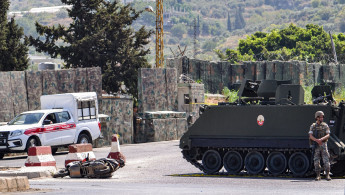Lebanese security forces kill nine suspected IS militants following hunt for killers of policemen
Lebanese police have killed nine suspected members of the Islamic State group in the hunt for "terrorists" linked to several deadly attacks, including some on soldiers, a security source said on Sunday.
The incident, which took place on Saturday, came more than a month after the army and security forces launched a manhunt for suspects in the August 21 killing of two municipal policemen and the son of the mayor of the northern village of Kaftoun.
Police intelligence units raided a house in the northern region of Wadi Khaled where "suspects linked to the IS" jihadist group had been holed up, "killing all the terrorists inside", the Internal Security Forces (ISF) said in a statement.
A security source said "at least nine members of the group were killed".
But the source said the death toll could rise as more bodies could be buried under the rubble of the house, part of which was blown up during the police operation.
The ISF statement said the "terrorist cell" was made up of more than 15 suspects. It added that three had been arrested in previous raids.
Following the August murders in Kaftoun, the army and police launched operations to track down the assailants.
On September 14, the army said four soldiers were killed while attempting to arrest suspected "terrorist" Khaled al-Tallawi at his north Lebanon home, though he was eventually shot dead.
Meanwhile, two Lebanese soldiers were killed overnight in an attack on an army post in the locality of Arman-Minyeh, also in the north of the country, the army said on Sunday.
"Two soldiers were killed, in addition to one terrorist," it said in a statement.
An attacker "riding a motorbike tried to enter the army post, and army members confronted him, killing him instantly", it added.
They found grenades and an explosives belt on him, the last of which "he had intended to detonate inside the post", according to the statement.
Wadi Khaled and the Arman-Miniyeh region are near Lebanon’s impoverished second city, Tripoli, which has seen violence in recent years, some of which has spilled over from the conflict in neighbouring Syria.
Follow us on Facebook, Twitter and Instagram to stay connected





 Follow the Middle East's top stories in English at The New Arab on Google News
Follow the Middle East's top stories in English at The New Arab on Google News
![The UAE is widely suspected of arming the RSF militia [Getty]](/sites/default/files/styles/image_330x185/public/2024-11/GettyImages-472529908.jpg?h=69f2b9d0&itok=Yauw3YTG)
![Netanyahu furiously denounced the ICC [Getty]](/sites/default/files/styles/image_330x185/public/2024-11/GettyImages-2169352575.jpg?h=199d8c1f&itok=-vRiruf5)
![Both Hamas and the Palestinian Authority welcomed the ICC arrest warrants [Getty]](/sites/default/files/styles/image_330x185/public/2024-11/GettyImages-2178351173.jpg?h=199d8c1f&itok=TV858iVg)